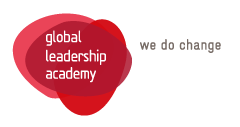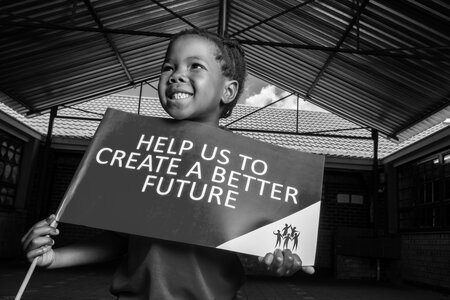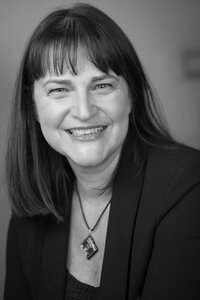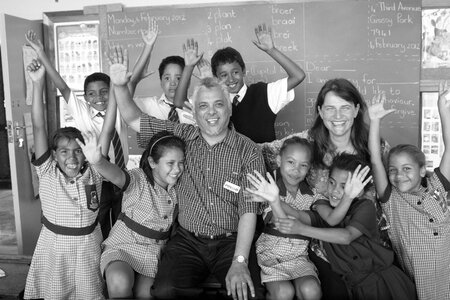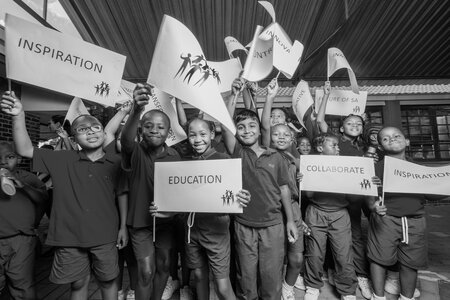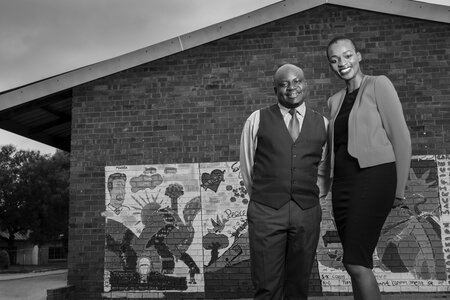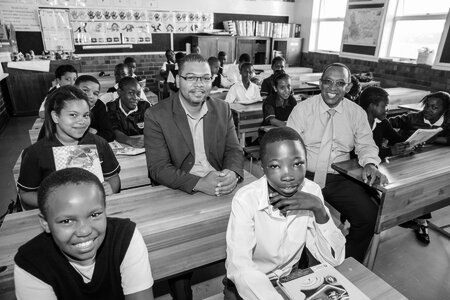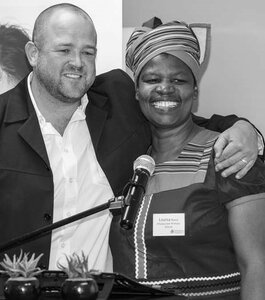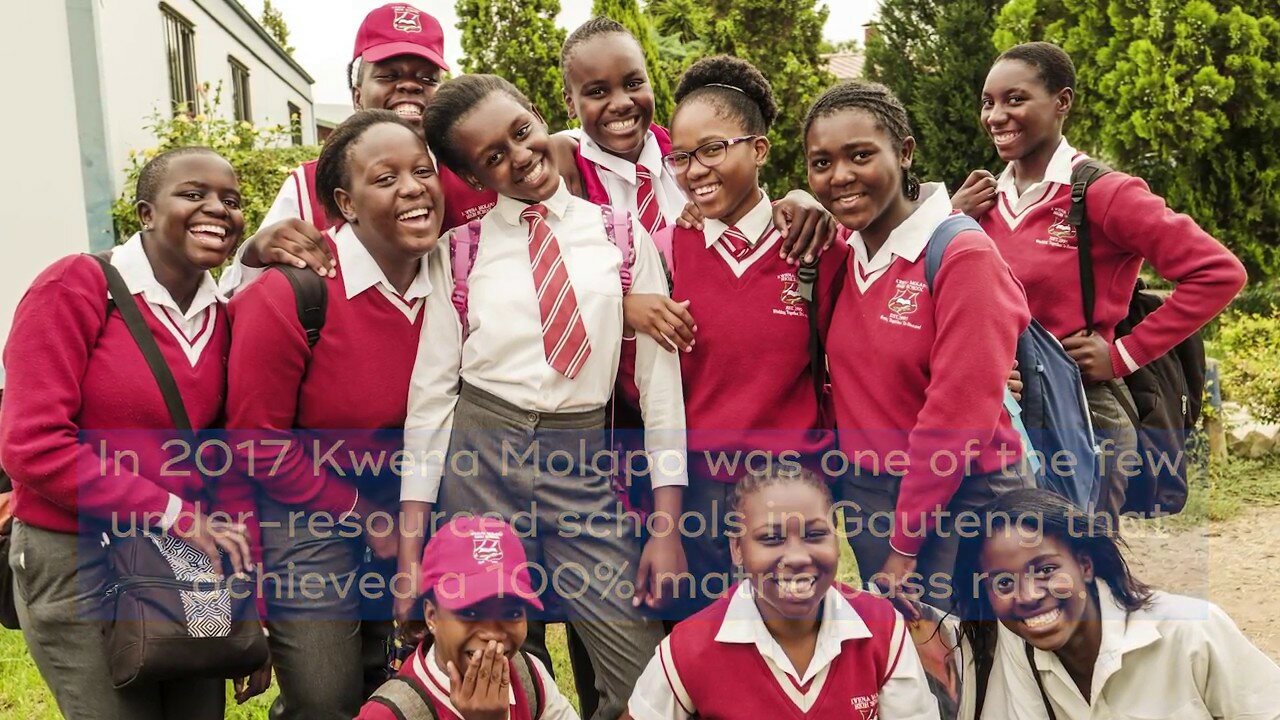A collaborative effort to strengthen South African schools
Louise van Rhyn is a social entrepreneur whose purpose in life is to create a better future. With over 20 years’ experience as a change practitioner Louise believes that the world’s huge intractable problems can be solved through cross-sector collaboration. She took up the cause of improving South Africa’s education system by introducing co-learning partnerships between school principals and business leaders.
Louise participated in the Global Wellbeing Lab 2.
South Africa’s next generation: 12 million pupils in 25,000 schools. Four out of five of these pupils attend schools that are considered dysfunctional. After four full years of schooling, a shocking 78% of children cannot read with comprehension. These early learning deficits cause children to fall behind over time and explains why almost half of all children in South Africa drop out of school and receive no qualification.
South Africa’s education crisis is devastating: It deepens social differences that remain after apartheid, intensifies inequality, and poses a huge obstacle to economic growth. Louise is not willing to accept this. Having worked with diverse local and global organisations in many countries, she is well versed in large scale change in complex social systems and is eager to apply her skills for the benefit of ALL South Africa’s children.
The starting point of a learning process
Against that backdrop, Louise, who holds a doctoral degree in large-scale complex social change, founded Symphonia for South Africa – an organisation that aims to strengthen the fabric of South Africa’s society by mobilising active citizenship around critical social challenges such as a failing education system. In 2010 she launched Partners for Possibility, a leadership development and principal support program. The program focusses on improving the quality of education by capacitating principals in under-resourced schools and building their leadership skills through partnerships with business leaders. Both partners participate in a 12-month leadership development program while tackling challenges in schools together.
Learn more about the Partners for Possibility approach and program structure
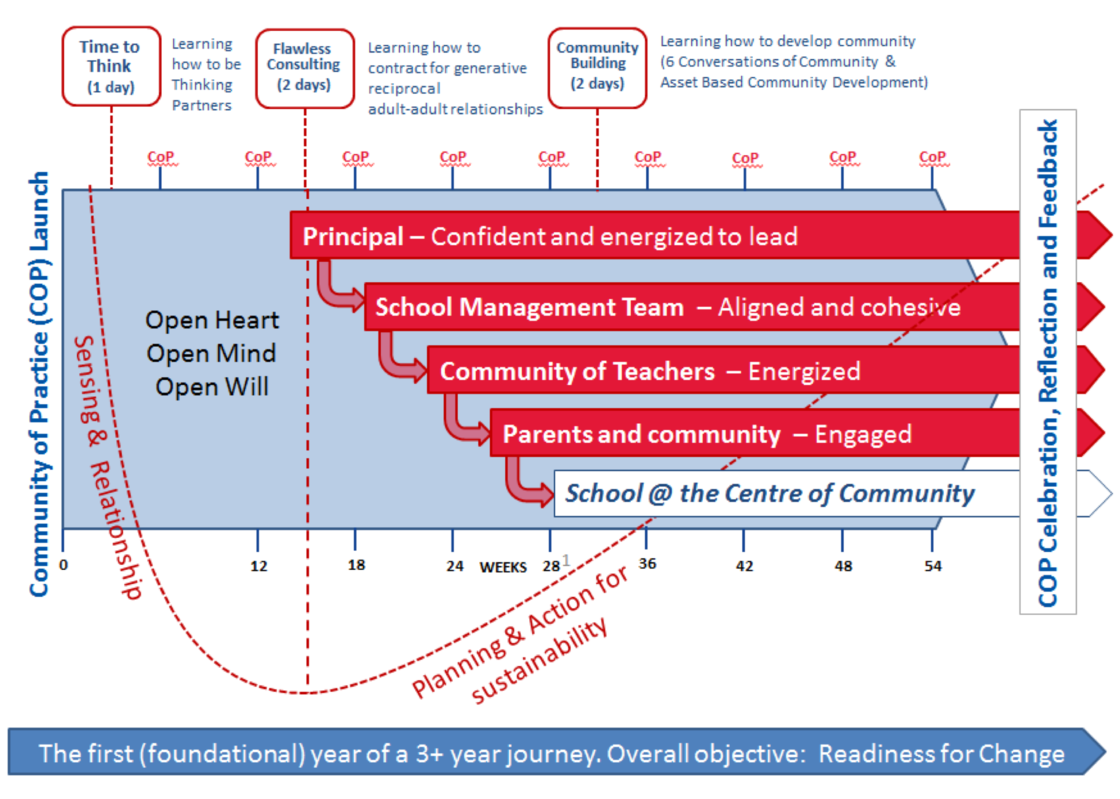
The program is based on the 70:20:10 model for adult learning and development.
Research has shown that around 70% of learning is experiential – it happens through day-to-day tasks, practice and problem solving. 20% is social learning which occurs through exploiting networks, collaborating with others, and co-operative actions. 10% of learning is formal and occurs through structured courses and training. The PfP program was therefore carefully designed to incorporate these 70:20:10 principles.
Time to Think (one day) workshop
Based on the work of Time to Think author Nancy Kline, teaches the skills for being a radically respectful, reciprocal ‘thinking partner’. This workshop takes place in month one of the program and in terms of Theory U it could be seen as a co-initiating experience for the leadership circle that typically consists of ten partnerships.
Flawless Consulting (two day) workshop
Based on the work of Peter Block, is seen as the ‘bottom-of-the-U’ moment in the PfP journey. This experience is designed to teach leaders how to develop generative, compassionate, adult-to-adult relationships with their stakeholders. They are introduced to the idea that ‘the delivery vehicle of my expertise is my humanity’. It is a strong ‘call to action’ experience and after this workshop partners usually feel equipped and ready to try out different things in their schools - which could be seen as prototyping in Theory U terms.
Community Building (two day) workshop
Also based on Peter Block’s work, teaches the skills for convening and building community. It enables participants to shift the narrative from one of problems and deficiencies to that of possibilities and gifts.
Community of Practice
Participants join the program as part of a group (known as a leadership circle) which typically includes 8-10 partnerships. Leadership circles meet every six weeks for 2-3-hour Community of Practice sessions during which they connect, share, reflect, and learn from each other.
Action learning
This tasked-based component makes up about around 70% of the program content. Every partnership meets regularly at their school to identify challenges and develop plans to address them. Principals spend several hours per month collaborating with their business partners and implementing actions with them. This gives principals the opportunity to form a one-to-one development relationship with a business leader who cares and is committed to being their thinking partner.
Although the facilitated program is only 12 months long, most partners remain in partnership and continue to do the work of mobilizing active citizenship around the school, so that the school is truly experienced as being at the center of the community (and children know what it feels like when the adults reclaim responsibility for raising them).
An invigorating experience
Asked about the questions she faced by the time she decided to take part in the Global Wellbeing Lab 2, Louise says: “We were going through the typical challenges to do with growing an under-resourced social enterprise – doing something that has never ever been attempted anywhere else in the world. We were frustrated by the fact that we were doing something really innovative and impactful and yet this wasn’t recognized as significant in South Africa – which prevented us from having the impact we want to have.”
Participating in the Lab helped Louise to overcome her sense of frustration: “It energized me, connected me with people, helped me to not feel so lonely in my task as a leader.” Her learning journey and conversations with other Lab participants generated some new insights: On a methodological level, she was inspired to more explicitly show how the design of the PfP journey was inspired by Theory U. It has helped her argue for a core element of the design, which is for business leaders and principals to spend time to ‘co-sense’ and invest in their relationships before attempting to ‘do’ things too early.
New paradigms, new collaborations
On a conceptual level, after returning to South Africa, Louise and her fellow South African participants agreed to choose South Africa’s Vision 2030 as the ‘North Star’ for their work. This led to dozens of conversations with other people who agreed that this could enable and facilitate collaboration across boundaries. It became a unifying force for many.
Louise was particularly inspired by the article that Otto wrote after the time in Bhutan. She remembers this as a big ‘Ah Ha’ moment. The idea of ‘cultivating the social field for collective impact’ specifically resonated with her and she realised that this is exactly what she and her colleagues have been doing in South Africa since 2008. She also realised that this work requires attention and resourcing and has since brought this into the organisational design. There is now a recognition that ‘cultivating the social field’ is part of the job description for some members of the team as this is a key enabler for collaboration.
Since April 2017 Louise has been working to establish the Coalition for Quality Education in the Western Cape. Her experience as a member of the Lab has profoundly shaped her approach to this work.
The Partners for Possibility process is informed by the ideas underpinning Asset Based Community Development which recognises the wisdom and power that lies in the community. The process is designed to result in ‘School at the Centre of Community’ where schools become a magnet for the gifts and contributions of members of the community.
The PfP process creates a fertile field for social action and many people have joined the movement to co-create a better future for South Africa.
Since its launch in 2010, Partners for Possibility has steadily gained momentum.
By August 2018 it had reached:
- 842 school principals
- 842 business leaders
- 21,050+ teachers
- 336,800+ families
- 673,600+ learners
Partners for Possibility’s impact recently earned the program a World Innovation Summit for Education (WISE) Award which underlines its significance as an international beacon among education projects.
“During the last few months I have come to realise that this may be the most important work of leadership – to cultivate the social field for collective impact.”
Louise van Rhyn
Contibuting to the Global Goals



